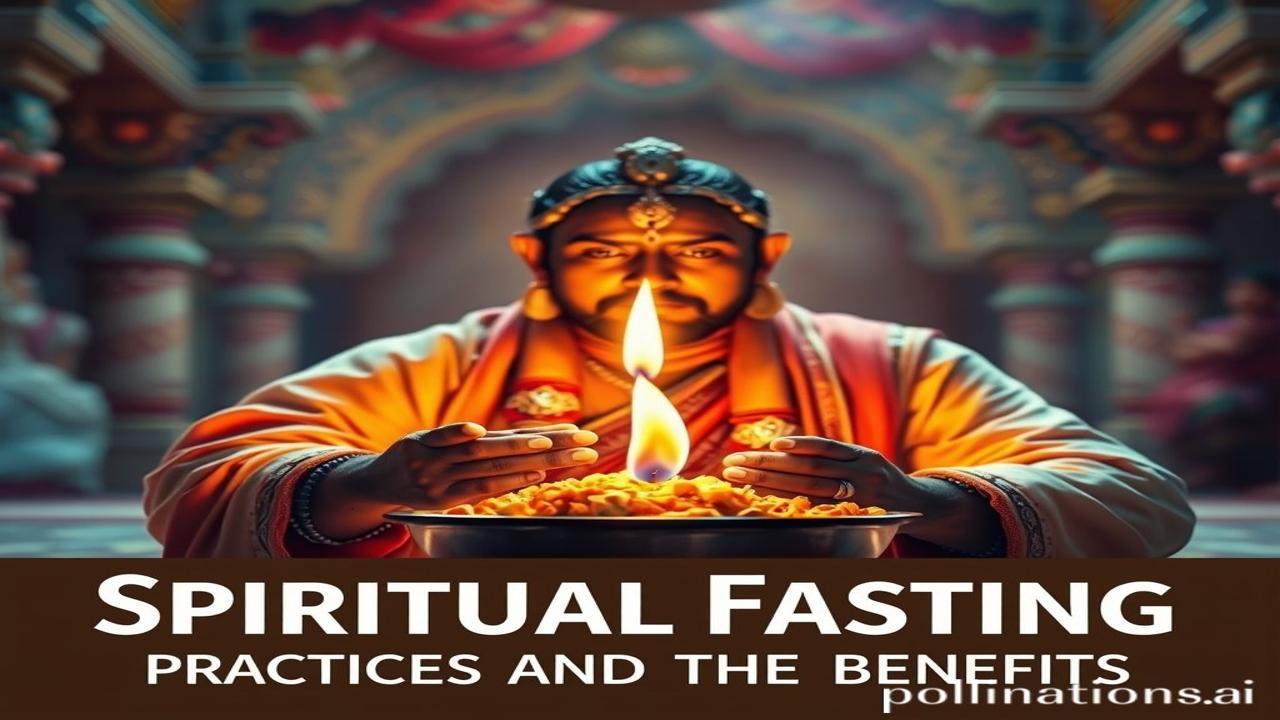Ruhaniyat ki Talaash: Spiritual Fasting Practices aur Unke Fayde
Kabhi socha hai, jab suraj ki pehli kiran Ganga ke paani ko chhooti hai, toh usme kya rahasya chupa hota hai? Waqt ke panno mein dabe, Bharat ki dharohar mein, vrat (fasting) ek aisi pratha hai jo sirf bhookh se zyada, aatma se judti hai. Let’s dive into the deep end of spiritual fasting practices and explore their benefits!
Kya Hai Yeh Spiritual Fasting, Bhai? (Historical & Cultural Context)
Spiritual fasting, yaani ruhani vrat, sirf khane se door rehna nahi hai. It’s a way to cleanse your body and your mind. Ye practice India mein thousands of years se chali aa rahi hai. Vedic texts mein iska zikr hai, aur Jainism, Buddhism, aur Hinduism mein iska bahut importance hai.
Kab aur Kahan se shuru hua?
Basically, yeh practice Indus Valley Civilization se bhi purani ho sakti hai! Vedas mein, vrat ko ek powerful spiritual tool maana gaya hai. Iska maqsad hai apne senses ko control karna, apne ego ko kam karna, aur apne andar ki shakti (strength) ko jagana.
Kyun Hai Yeh Important?
Yeh sirf tradition nahi hai, yaar! Spiritual fasting is about connecting with the divine. It’s about self-discipline, gratitude, and purifying your soul. History mein, kings aur rishis dono hi vrat rakhte the—kings apni praja ki bhalai ke liye, aur rishis enlightenment ki talaash mein.
Gaon ki Galiyon Mein: Logon ka Jeevan (Deep Dive with Human Element)
Socho, ek chhota sa gaon. Subah ki aarti ho rahi hai. Ma, naha dhokar mandir jaati hain, unka vrat hai.
Ma Rukmini: “Aaj Shivratri hai, Panditji ne kaha vrat rakhna shubh hoga. Mann shant rahega, aur Prabhu ki kripa bani rahegi.”
The atmosphere is filled with devotion. Farmers, artisans, sabhi apne tareeke se fasting karte hain. Koi ek time khana chod deta hai, toh koi sirf fruits aur milk pe rehta hai. Ye sab unke daily routine ka hissa hai, unke beliefs ka, aur unki life ka.
Aaj ki Duniya Mein Dharm aur Pehchaan (Cultural Significance Today)
Aaj bhi, India mein fasting ek vibrant practice hai. Ramzan, Navratri, Karwa Chauth, Ganesh Chaturthi – har festival mein vrat ka apna importance hai.
Bharatiyata aur Modern Identity:
Ye sirf religion ki baat nahi hai. It’s about our cultural identity. Hum apni jaddon se jude rehte hain. Fasting reminds us of our values – self-control, empathy, and gratitude. Even in the modern world, when stress levels are high, people are turning to fasting for mental clarity and peace.
Mazedar Sach: Myths aur Realities (Fun Fact or Myth-Buster)
Myth: Vrat rakhna sirf religious logo ke liye hai.
Reality: Many doctors and scientists now agree that intermittent fasting and calorie restriction have significant health benefits, regardless of your religious beliefs.
Fact: Did you know that some ancient Indian texts describe different types of fasts, including water-only fasts and fruit-only fasts, depending on the person’s constitution and goals?
Drishti aur Bhavnaen: Sensory Experience
Imagine the aroma of incense sticks filling the air. The cool touch of the temple floor under your bare feet. The rhythmic chanting of mantras echoing in your ears. Ye sab aapko ek different level pe le jaate hain, jahan sirf aatma aur Ishwar ka connection hota hai.
Antim Vichar: Aakhri Baat (Closing Insight or Quote)
“आहारशुद्धौ सत्त्वशुद्धिः सत्त्वशुद्धौ ध्रुवा स्मृतिः। स्मृतिलाभे सर्वग्रन्थीनां विप्रमोक्षः॥”
(Ahara shuddhau sattva shuddhih, sattva shuddhau dhruva smritih, smriti labhe sarva granthinam vipramokshah)
This Sanskrit shloka means: “By purity of food, one’s inner nature becomes purified; by purification of inner nature, memory becomes firm; by the strengthening of memory, one is released from all bondages.”
Spiritual fasting is not just about denying yourself food. It’s about embracing a lifestyle of mindfulness, gratitude, and connection with something greater than yourself. Toh, try it! Maybe you’ll discover something amazing about yourself.
